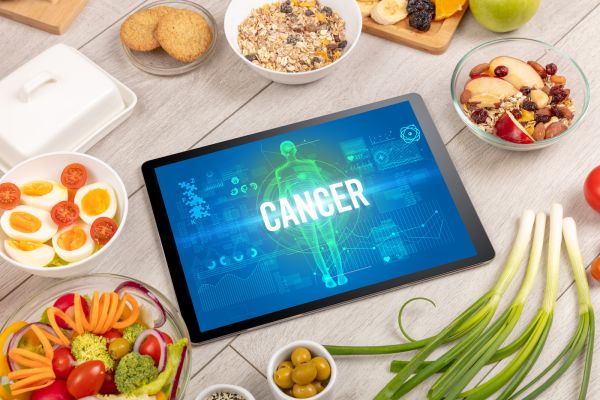Nausea and vomiting may occur during or a few hours after your treatment (acute), or much later (delayed). Not everyone will experience this side effect, but it is most common in people who have had general anesthesia for surgery or who receive certain cancer therapies, such as:
- Chemotherapy. Cancer cells reproduce very quickly, and many chemotherapies work by attacking cells that reproduce rapidly. Some healthy cells, such as those that line the digestive tract, also reproduce rapidly and these too can be affected. Your body will replace these cells with new, healthy cells when treatment ends. During treatment, however, you may have nausea and vomiting.
- Radiation therapy. Radiation to the digestive system, liver, brain, or whole body.
- Other treatments that irritate your mouth, esophagus, or stomach, or that affect your sense of balance.
What is anticipatory nausea?
After having a few treatments, some people may start to have nausea and vomiting before their next treatment. This is called anticipatory nausea/vomiting. It is usually set off by a trigger, such as a certain odor smelled during previous treatments. The more treatment sessions you have, the greater your risk for anticipatory nausea and vomiting. The sooner anticipatory nausea and vomiting is identified, the more effective treatment may be. Other factors may increase your risk for anticipatory nausea, and the more factors you have, the higher your risk.
Risk factors include:
- Being younger than age 50
- Assigned female at birth
- A history of motion sickness, morning sickness during pregnancy, or high anxiety in certain situations.
- The type and dose of your chemotherapy medications
- How often you have had nausea after chemotherapy
- Expecting to have nausea and vomiting before a treatment.
- If after earlier chemo treatments you had nausea and vomiting (either right away or delayed), felt warm or hot, or felt dizzy or lightheaded.
Anticipatory nausea and vomiting may be treated with guided imagery/relaxation, hypnosis, biofeedback, behavior modification and distraction. Drugs used for nausea and vomiting (antiemetics) do not seem to be effective for anticipatory nausea.
Seek help from your healthcare team
It is important to keep in contact with your healthcare team at Roswell Park Comprehensive Cancer Center about how you are feeling, and whether prescribed medication is helping — and how much. Anti-nausea medications can be taken by mouth, given through an IV (intravenously) or injection, absorbed from a skin patch, by using a rectal suppository, or by placing a dissolvable strip under your tongue or inside your cheek. Follow your doctor’s instructions carefully on when and how to take your medications.
Have nutrition questions?
Our nutrition team at Roswell Park plays an important role in your care — before, during and after treatment.
Learn moreTips to help prevent or ease nausea
If your nausea only lasts an hour or two, you may want to avoid eating during this time and just take a few sips of water, juice or weak tea to prevent dehydration. If nausea lasts longer, you will need to find ways to get the nutrients and fluids your body needs. Here are some suggestions:
- Eat smaller portions, more frequently (instead of three larger meals a day).
- Eat foods at room temperature.
- Avoid foods with strong or unpleasant odors (including during cooking).
- If you cannot eat or drink very much, try a salty, bland food (such as pretzels), as the salt will help you retain bodily fluids.
- Drink most of your fluids between meals — only drink enough to keep food moist at meals.
- If you have vomited, wait an hour, then start with small sips of water or a clear fluid such as flat ginger ale. If that stays down, try small amounts of bland foods such as dry crackers or dry toast.
- Rinse your mouth frequently to rid your mouth of unpleasant tastes.
- Try taking a slow walk — the fresh air might decrease your nausea.
- Avoid clothes that press against your stomach and throat areas.
- If you are having difficulty eating or drinking enough to meet your nutritional needs, ask your nurse for a referral to a Roswell Park dietitian who can work with you to design a food plan that meets your needs.
Keep to foods that are easy on the stomach such as:
- Ice pops
- Clear soups
- Weak tea
- Fruit juice (not orange or grapefruit)
- Liquid supplements, such as Ensure®
- Bananas
- Applesauce
- Yogurt
- Pudding
- Cottage cheese
- Eggs
- Peanut butter
- Solid foods
- White bread
- Rice
- Potatoes
- Pasta
- Crackers
- Cooked fruits
- Cooked chicken or turkey (no skin)
- Lean beef
- Fish (not fried)
Food and drinks to avoid
These foods and drinks are more likely to cause nausea and stomach upset:
- Greasy, fried or fatty foods
- Spicy foods
- Acidic foods and drinks
- Coffee
- Strong tea
- Energy drinks
- Candy that includes caffeine (like chocolate)
- Alcohol
- High fiber foods, including:
- bran, oatmeal, fresh fruits, whole-grain breads, broccoli, corn and beans.
When should I call my doctor?
It is very important to stay hydrated. If you are vomiting, have diarrhea or severe nausea that prevents you from eating and drinking, you must take steps to avoid dehydration. Dehydration can result in kidney failure, neurological symptoms, arthritis, skin problems, confusion and disorientation. Severe dehydration leads to changes in your body’s chemistry, such as potentially life-threatening electrolyte imbalances. Call your doctor right away if you:
- Have nausea that is not responding to prescribed medication, lasts more than two days, or interferes with your daily activities
- Have severe stomach pain or blood in your vomit (may appear red or black)
- Cannot keep food, liquid or anti-nausea medication in your stomach
- Vomit three or more times per hour for more than eight hours, have projectile vomiting (vomiting with extreme force), or have vomiting with dizziness or confusion
- Lose two pounds or more in one day
For more information, see the patient education, Managing Nausea and Vomiting, or get a copy in The 11 Day Power Play Cancer Resource Center, located on the 1st floor, by the Tower elevators.



